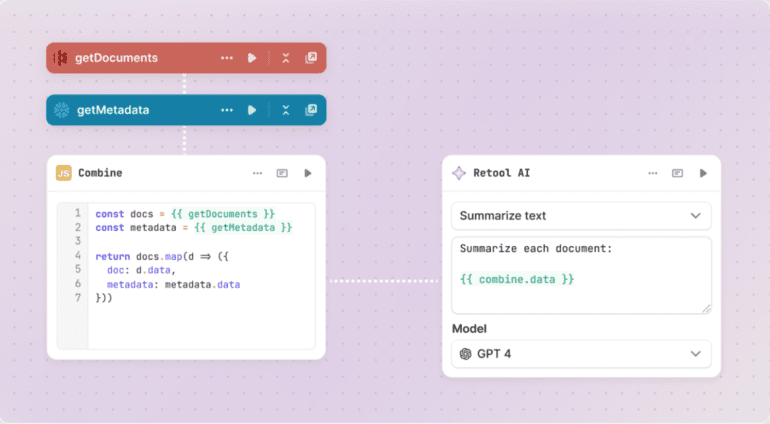TL;DR:
- Retool, a low-code platform, expands its offerings with a new workflow automation service.
- The company introduces a hosted vector store for enhancing AI-based app development.
- CEO David Hsu emphasizes the importance of contextual data for AI-driven applications.
- Retool Vectors, a hosted vector storage service, simplifies data integration and keeps it up-to-date.
- Seamless synchronization with business apps like Salesforce is a key challenge addressed.
- Retool leverages vectorization and OpenAI’s API to boost AI chatbot performance.
- AI-based actions for text summarization, classification, and image generation are introduced.
- Retool’s partnership with OpenAI aims to expedite AI adoption in businesses.
Main AI News:
Retool, the low-code platform that initially carved its niche in constructing line-of-business applications, has evolved into a comprehensive ecosystem. Over the past few years, this well-funded startup has seamlessly integrated a slew of backend services. Most notably, they have just unveiled a groundbreaking workflow automation service. But that’s not all – today, Retool is ushering in a new era with an array of tools designed to empower its users in creating AI-infused applications. Among these tools is a cutting-edge hosted vector store, a resource poised to revolutionize the way large language models (LLMs) harness contextual data.
David Hsu, the CEO and co-founder of Retool, revealed to us that a significant portion of their clientele is already exploring the potential of AI in their applications. For these enterprises, the true value of such tools lies in their ability to make sense of internal data. While some resort to the cumbersome process of manual data entry to provide context, this approach is neither efficient nor cost-effective in the long run. Although building custom models from scratch is a resource-intensive endeavor, Hsu believes that fine-tuning existing models with a modest dataset is a viable middle ground. However, he asserts that even this approach is not without its challenges. Maintaining the accuracy and relevance of such fine-tuned models is an ongoing battle.
Currently, the gold standard for integrating custom data into LLMs is through vectorization, a process that facilitates easy accessibility for these models. This trend is evident in recent launches by tech giants such as Google, Microsoft, DataStax, and MongoDB, all rolling out their vector search services. However, according to Hsu, the true differentiator is not the choice of the vector database but rather the methodology employed to populate it with data and keep it up to date. The challenge lies in seamless synchronization with business applications like Salesforce, enabling real-time access to fresh data for LLM-driven inquiries.
To address these formidable obstacles faced by their customers, Retool is unveiling Retool Vectors, a hosted vector storage service built upon the open-source pgvector extension for Postgres. Internally, Retool experimented with Intercom’s GPT-powered AI chatbot, achieving an impressive 20% ticket closure rate. But when this custom bot was armed with a vector database integrated with all of Retool’s Salesforce data and support information, its closure rate soared to nearly 60%. Retool even went a step further by vectorizing all transcripts from sales calls and leveraging OpenAI’s API for querying.
A noteworthy feature of Retool’s new offering is its seamless integration with the recently launched Workflow service. This ensures that a business’s production database remains synchronized with the vectorized database, guaranteeing that the models have access to the most current information.
In addition to the vector storage service, Retool has introduced a range of AI-powered actions tailored to common use cases. These include text summarization, classification, image generation, and more. Collaborating closely with OpenAI, Retool has seamlessly integrated these features into Retool Workflows. Brad Lightcap, Chief Operating Officer at OpenAI, expressed his enthusiasm for the partnership, emphasizing the role of tools like Retool in expediting the integration of AI into business operations while prioritizing safety. The path to AI-driven business applications has never been clearer, and Retool is leading the way.

Source: Retool
Conclusion:
Retool’s strategic expansion into AI integration with its hosted vector storage service and AI-based actions is poised to transform the market. By simplifying data integration and synchronization, Retool addresses critical pain points for businesses looking to harness the power of AI. The partnership with OpenAI underscores their commitment to driving AI adoption in the business landscape, promising efficiency gains and enhanced customer experiences for enterprises.

